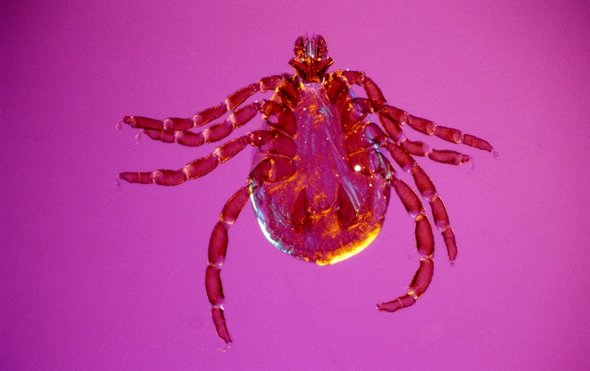(单词翻译:单击)
听力文本
This is Scientific American — 60-Second Science. I'm Jason G. Goldman.
Got a minue?
Ticks. The tiny arachnids feed on the blood of mammals, birds, and sometimes even reptiles and amphibians. And disease-causing parasites travel in that blood, from tick to victim and from victim to tick. The most familiar tick-borne illness is probably Lyme disease, but ticks can also transfer Rocky Mountain spotted fever, tularemia, Q fever, and even a form of encephalitis. Without treatment, many of these diseases can be fatal.
Keeping tick populations in check is thus good for public health. And it seems that the mere presence of large wildlife helps. Because a new study done in Kenya finds that areas without large wildlife saw tick populations rise as much as 370 percent. The finding, in the Proceedings of the Royal Society B, caught researchers by surprise—because ticks love to land on large animals.
"We expected if we lost large animals that we would also lose ticks."
University of California, Santa Barbara, ecologist Georgia Titcomb.

Before they get to their big targets, such as deer or antelopes, ticks attack small mammals, like rodents.
"So what we found is when you lose the large animals, you have an increase and a hyper-abundance of these rodents." Because those rodents are not being eaten, or simply displaced, by the bigger animals missing from the environment.
So the ticks happily feed on the rodents, after which they'd normally look for a bigger animal to parasitize before reproducing. Now, with no large mammals available, humans could become an attractive tick target—and more likely to come down with the various tick-carried conditions.
The study demonstrates one of the many ways in which biodiversity loss can be detrimental not just for wildlife but for people, too. The researchers are now doing similar work in California to see how if the Kenya findings hold elsewhere. Because lions, tigers and bears may seem scary. But the more likely danger to humans comes from ticks.
Thanks for the minute for Scientific American — 60-Second Science. I'm Jason G. Goldman.
参考译文
这里是科学美国人——60秒科学。我是杰森·古德曼。
有一分钟时间吗?
蜱虫。这种极小的蛛形纲动物以哺乳动物和鸟类的血液为食,它们有时甚至还会吸爬行动物和两栖动物的血。致命寄生虫通过血液传播,从蜱虫到受害者,从受害者到蜱虫。最常见的蜱虫传播疾病可能是莱姆病,但是蜱虫也可以传播落矶山斑疹热、兔热病、Q热,甚至是一种脑炎。如果不进行治疗,那许多这类疾病都会致死。
控制蜱虫数量对公共健康有好处。似乎只有大型野生动物的存在才有帮助。因为一项在肯尼亚进行的新研究发现,没有大型野生动物的地区,蜱虫数量增加了370%。这篇发表在《英国皇家学会学报:B辑》上的研究令研究人员颇为吃惊,因为蜱虫喜欢寄宿在大型动物身上。
“我们此前认为,如果大型动物的数量减少,那蜱虫的数量也会随之减少。”
加州大学圣塔芭芭拉分校的生态学家乔治娅·泰特寇波说。
在找到鹿或羚羊等大型目标前,蜱虫会攻击鼠类等小型哺乳动物。
“因此我们发现,当大型动物数量减少时,这些鼠类动物的数量就会飙升。”因为大型动物从环境中消失后,这些鼠类动物就不会被吃掉或是简单地被迫离开。
因此,通常在寻找大型动物寄生并繁殖前,蜱虫会乐于食用鼠类的血液。现在,如果找不到大型动物,那人类可能成为对蜱虫有吸引力的目标,而且人类也更易染上蜱虫携带的各种疾病。
这项研究证明了生物多样性丧失不仅会损害野生动物也对人类不利的多种方式之一。现在研究人员正在加利福尼亚州做类似工作,目的是看看肯尼亚的发现在其他地方是否依然成立。因为狮子、老虎和熊可能看起来很可怕。但是人类更大的威胁可能来自蜱虫。
谢谢大家收听科学美国人——60秒科学。我是杰森·古德曼。
译文为可可英语翻译,未经授权请勿转载!
重点讲解
重点讲解:
1. keep in check 受到控制的;被控制住的;
Executive-level leaders must have self-awareness and an ability to keep their emotions in check.
高管级别的领导人必须有自知之明,能够控制自己的情感。
2. catch sb. by surprise 使某人吃惊,使某人感到意外;
He quickly got up from his chair, it caught him by surprise, And when he opened up the door could not believe his eyes.
他赶紧从椅子上站起,有人来访实在让他惊奇,打开门时,他无法相信自己的眼睛。
3. come down with 染上,得了(病);
Thomas came down with chickenpox at the weekend.
托马斯周末染上了水痘。
4. come from 来自;
Much of the opposition to this plan has come from the media.
该计划的主要反对声音来自媒体。


